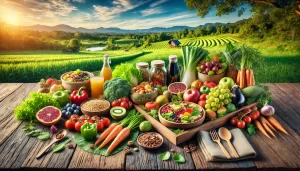In today’s world, choosing an organic diet is more than a trend; it’s a step towards a sustainable lifestyle. As people learn about the differences between organic and conventional food, they see the benefits of organic. Organic farmers focus on food safety, ensuring our fruit and veggies are free from harmful pesticides and chemicals.
When we buy organic products like organic milk and dairy, we support farming that’s better for the environment. Knowing what organic means helps us understand the care that goes into organic food production. Organic crops are grown naturally, which helps the soil and supports many different plants and animals.
This shows why choosing organic is important for a healthier future. Making smart choices about our diet, like picking organic over conventional, helps us live more sustainably and healthily.
Key Takeaways
- Organic diets promote better health through natural food sources.
- Choosing organic food contributes to environmental sustainability.
- Higher nutrient intake is associated with organic food consumption.
- Reducing exposure to harmful chemicals is a primary benefit of an organic diet.
- Making eco-friendly choices in your diet supports a sustainable lifestyle.
What is the Importance of an Organic Diet?
The importance of an organic diet is huge. It affects health, the environment, and the food industry. Here are some key points:
- Healthier Nutrition: Organic food often has more vitamins and antioxidants than non-organic food. This is because organic farming uses natural methods.
- Fewer Chemicals: Organic dairy and produce have fewer pesticides and chemicals. This lowers the risk of toxins.
- Better for the Environment: Organic farming helps the soil and supports many species. It’s better for the planet and ensures food for the future.
- Enhanced Animal Welfare: Animals from organic farms live better. This means they have a better life.
- Improved Taste and Quality: Organic food often tastes better. It’s grown in soil rich with nutrients, without synthetic additives.
- Support for Local Farmers: Buying organic helps small, local farmers. They focus on sustainable farming.
- Systematic Review Findings: Studies show organic food is safer and better for you and the planet.
Choosing an organic diet can make a big difference. It’s good for your health and the environment.
What are the Benefits of Choosing Organic?
Choosing organic has many benefits for you and the earth. The main advantages are:
- Less pesticide exposure for a healthier life.
- Less harm to the environment, supporting sustainable farming.
- More diverse ecosystems, which are stronger.
- Better nutrition, with more vitamins and minerals.
Adding organic food to your meals makes you safer and healthier. It’s a way to help the planet and support farming for the future.
Organic Farming Practices
Organic farming is all about making things sustainable, keeping things diverse, and taking care of the soil. It uses nature’s own ways to grow crops and protect the planet. This approach helps crops grow well without hurting the environment.
What Makes Farming Organic?
Organic farming is all about using things found in nature. Farmers use crop rotation, cover crops, and compost to keep the soil healthy. They don’t use synthetic fertilizers or pesticides, which helps create a balanced ecosystem.
Healthy soil means plants get the nutrients they need to grow strong. Crops grow well without the bad effects of chemicals.
Comparing Organic and Conventional Methods
Organic and conventional farming are very different. Conventional farming often uses chemicals to make crops grow more. But organic farming uses natural ways to make things sustainable. This can lead to:
- Less harmful chemicals in food
- A cleaner environment because of less pesticide use
- Better taste in crops because they grow in a healthier way
Knowing these differences shows why organic farming is important. It’s all about making healthy food and taking care of the Earth.
Health Benefits of an Organic Diet
Choosing an organic diet can greatly improve your health. Organic foods offer many nutritional benefits. Let’s explore how these choices can help your body and lifestyle.
How Organic Foods Affect Human Health?
Studies show a strong link between organic foods and more nutrients. Organic produce has more antioxidants, which fight oxidative stress in the body. These foods also avoid harmful chemicals, lowering your risk of chronic diseases.
This makes an organic diet great for those who care about their health.
Potential Nutritional Advantages
Some research points out that organic foods might have more nutrients than non-organic ones. Organic meat and dairy have fewer harmful additives and more healthy fats. Adding these to your meals can boost your health and meet your nutritional needs.
| Aspect | Organic Foods | Conventional Foods |
|---|---|---|
| Nutrient Levels | Higher in antioxidants and beneficial nutrients | Lower in beneficial nutrients |
| Chemical Residues | Minimal exposure to harmful chemicals | Possible exposure to pesticides and additives |
| Chronic Disease Risk | Potentially lower risk | Higher risk due to chemical exposure |
Environmental Impact of Organic Agriculture
Organic farming has a big positive effect on the environment. It uses sustainable methods that help biodiversity and protect ecosystems. This way, farming and nature work together in harmony.
How Organic Practices Support Sustainability?
Organic farming is key to true sustainability. It uses crop rotation, cover cropping, and composting to make soil better without chemicals. These methods help keep carbon in the soil, prevent erosion, and hold water better. They also make a home for many species, keeping ecosystems healthy.
Reduction of Pesticide Use and Pollution
Chemical pesticides harm the environment and our food. Organic farming uses much less pesticide, which means less pollution. It protects wildlife and keeps our water clean. This makes the whole community healthier.
| Aspect | Organic Agriculture | Conventional Agriculture |
|---|---|---|
| Pesticide Use | Minimal, natural alternatives | High, synthetic chemicals |
| Soil Health | Improved, sustainable practices | Degraded, often reliant on chemicals |
| Water Quality | Less pollution, healthier ecosystems | Higher risk of contamination |
| Biodiversity | Encouraged through diverse cropping | Reduced, monoculture practices |
Organic Diet: A Path to Healthier Eating
Choosing an organic diet is a big step towards eating healthier. It means picking whole foods full of nutrients. By eating seasonal produce, you get fresher food and help the planet too.
Organic food is good for more than just your health. It cuts down on harmful pesticides and chemicals in food. This choice is better for you and the earth.
Knowing how good an organic diet is can make you want to eat better. Here are the main reasons to go organic:
- More fruits and veggies for a balanced diet.
- Better digestion without synthetic additives.
- Learning more about where your food comes from.
Adding these habits to your life makes you healthier and more connected to your food. Choosing organic is the first step to eating better.
| Aspect | Organic Diet | Conventional Diet |
|---|---|---|
| Nutrient Density | Higher in antioxidants and vitamins | Potentially lower but varies |
| Use of Chemicals | Free from synthetic pesticides | Often treated with pesticides |
| Environmental Impact | Promotes biodiversity and sustainability | Can lead to soil degradation |
| Flavor | Typically fresher and richer | Varies significantly |
The Role of Organic Certification
Understanding organic certification is key to knowing if the food you buy meets certain standards. There are different levels of organic content and farming practices. Seeing organic labels on products helps you make better food choices.
Understanding Organic Labeling
Organic labels help you pick the right organic products. The main types include:
- 100% Organic: This label means the product has only organic ingredients and no synthetic chemicals.
- Organic: This label means at least 95% of the ingredients are organic, with up to 5% being non-organic but approved for use.
- Made with Organic Ingredients: These products have at least 70% organic ingredients but can’t use the USDA Organic seal.
Knowing these labels helps you make better choices and keeps you safe from harmful foods. Buying products with the USDA Organic label means you’re getting items made under strict rules for your safety.
Importance of USDA Organic Standards
The USDA Organic standards are crucial for organic certification. They ensure farming is good for the environment and safe for food. All organic products must pass strict checks to meet these standards. Some key parts of these standards are:
| Standard | Description |
|---|---|
| Soil Health | Uses crop rotation, composting, and organic fertilizers for healthy soil. |
| Pest Management | Uses natural pest control methods, cutting down on synthetic pesticides. |
| Animal Welfare | Guarantees humane treatment and organic feed for animals. |
These standards give you confidence that you’re choosing organic products good for your health and the planet. Making smart choices about organic foods helps make our food system safer.
Consumer Demand for Organic Products
More people want organic products because of health and sustainability concerns. They choose organic food for its benefits, like fewer chemicals and better farming methods. This change shows a big move towards healthier eating habits.
Trends in Organic Food Consumption
Food shopping habits are changing fast. Organic food is becoming a top choice for many. People want products with less chemical use and made in a sustainable way. As more learn about the effects of food on health and the planet, organic foods are becoming more popular.
Reasons Behind the Shift to Organic
There are many reasons why people are choosing organic. They see it as a healthier and more ethical food option. They worry about the safety of regular food and the harm traditional farming can do to the environment. These reasons explain why organic products are selling more in the U.S.
Choosing Organic: Tips for Your Grocery List
Shopping for organic food can seem tough at first. Learning key tips for buying organic makes it easier. Knowing how to read labels and picking the right organic produce helps you make smart choices. These choices are good for your health and help sustainable farming.
How to Read Food Labels Carefully?
It’s important to understand food labels to pick real organic products. Always check for the “USDA Organic” label. This means the product meets strict organic standards. Read labels well, focusing on ingredients to make sure there are no non-organic additives.
This way, you can be sure your list has true organic food.
Best Practices for Buying Organic Produce
When buying organic fruits and veggies, go for seasonal ones for the best taste and freshness. Local farmers’ markets are great for finding organic items at good prices. Shopping there helps support local farmers and gets you quality organic produce.
Make sure your list has a variety of items for good nutrition. Try to include a rainbow of colors, which means more vitamins and minerals.
| Tips for Buying Organic | Details |
|---|---|
| Read Food Labels | Check for USDA Organic certification and review the ingredients list. |
| Visit Local Farmers’ Markets | Support local economies and find fresh, organic produce often at lower prices. |
| Choose Seasonal Items | Seasonal produce is typically fresher, tastier, and usually more affordable. |
| Make a Grocery List | Plan ahead and include a variety of organic food products for balanced nutrition. |
Conclusion
Choosing an organic diet is more than a trend; it’s a way to improve your health and help the planet. Organic food offers many benefits, like cleaner air, healthier soil, and less chemical use. By picking organic, you help support green practices that help everyone, including the Earth.
Healthy eating with organic foods means you get to enjoy a wide range of tastes and nutrients. These foods are often better without the use of conventional farming methods. As you try organic foods, you’ll find tasty and healthy options that match your values and boost your health.
Now is the perfect time to go organic, for a healthier future for you and your kids. Making smart food choices means you’re supporting a better food system and a healthy environment. Every meal becomes a chance to help your health and the planet.
FAQ
What is organic food?
Organic food is made without synthetic fertilizers, pesticides, or genetically modified organisms. It follows strict farming rules.
What are the benefits of an organic diet?
Eating organic can increase nutrient intake and lower chemical exposure. It can also improve health and help the environment.
How can I ensure I’m buying certified organic products?
Check for “USDA Organic” labels. These labels mean the food meets organic standards, using organic farming methods.
Are organic foods safer than conventional foods?
Organic foods often have fewer pesticide residues and additives. This makes them safer for health and the environment.
How can I include more organic food in my diet?
Begin by swapping some non-organic items with organic ones in your shopping list. Start with fruits and veggies most likely to have pesticides.








